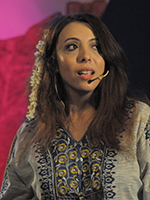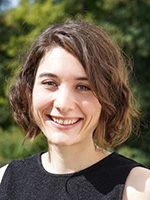Challenges and Resistances for Feminist Peace Work in Yemen
Interview with Hind Aleryani by Clara Perras
Clara Perras: What does the 8th of March mean to you?
Hind Aleryani: To me personally, this day reminds me how hard it was for me as a Yemeni woman to have my freedom. I gave up a lot of things that people think are important. I risked many things, but it was worth it. Now, I have my freedom, and nobody can tell me what I should and shouldn't do. I refused to let society tell me that I am not smart or strong enough. This day reminds me to celebrate my achievements and every woman's achievements. It also reminds me that there is still a lot to be done, especially when we read in the news daily about women who got killed in Arab countries just because they dared to say no to a man.
“It [...] reminds me that there is still a lot to be done, especially when we read in the news daily about women who got killed in Arab countries just because they dared to say no to a man.”
Clara Perras: How have you seen your feminist work impacting the Yemeni context?
Hind Aleryani: When I decided to be a public person in 2010, show myself as I am, it was a hard decision because many members of my extended family felt embarrassed. I showed my hair and held opinions that are not what that society would like to hear. At that time, I was the only female in the family who had a public account on Facebook and didn't wear a Hijab. People were (and are still) wondering how someone from a family that studied Shariya would be like this. My grandfathers and my uncles were judges, and it was a big thing for Yemenis to see a woman from this family showing her hair and acting free. Then I led protests in front of the parliament. This was something nobody expected me to do because I was a very shy person, but I made this change and today, I see many girls from my family and outside of my family doing the same. They don't feel like it is as shameful as before.
Clara Perras: What are the challenges and resistance you experience during your feminist peace work?
Hind Aleryani: Usually, when a woman talks about politics, it is very easy to target her and ruin her reputation. In 2016 during the Kuwait peace talk, I did a big campaign that was recognized by governments and the UN envoy, but the war parties were against it, even though they wrote that they supported the campaign. Their journalists and people who support them, were attacking me. Every party accused me of working with the other party saying that peace will benefit their enemy. I succeeded to make people on the ground believe that peace is possible, but unfortunately the war eventually continued, and they refused to make a peace deal.
Clara Perras: How do you think this is connected to the global challenge for women's rights?
Hind Aleryani: The challenge for women is that they are excluded from decision making. Political parties or other groups, when they have had to choose women to represent them, would choose women who stayed silent and did nothing useful, just following orders. Many women I know, who now have these positions, don't even know what is going on, they are not informed.
I believe, I have more strength being independent. When I mediated for the release of the six Bahais (religious minorities), I used my power in the media and was respected even by the people who were against me. This was, because they knew I didn't have an agenda. My only agenda was to help these people. So, I believe a woman can make a difference without having a political party to support her. My voice was my strength along with the network that I made throughout the years.
“The war is the reason that extremist groups are now ruling Yemen, and they are starting to take the basic rights that women have.”
Clara Perras: What is your feminist vision for peace and the future of Yemen?
Hind Aleryani: The war is the reason that extremist groups are now ruling Yemen, and they are starting to take the basic rights that women have. At the same time, I think that the war also made many women become independent because they had to work and start their own small businesses to survive. This gives me hope that after the war these women will have a lot of power and won't be ignored or used politically as before.
Clara Perras: What helps you to keep going in your daily feminist work?
Hind Aleryani: What helps me is the change I see in the new generation; how young feminists are strong and dare to talk about issues. It is true that many are still hiding behind fake names, but I can see that change is coming.
“What helps me is the change I see in the new generation; how young feminists are strong and dare to talk about issues. [...] I can see that change is coming.”
Hind Aleryani is a writer, journalist, and member of the UN Women Yemeni Women's Pact for Peace and Security. Hind let serval campaigns and protests to support peace in Yemen and to protect the rights of women and minorities. She moderated, attended and spoke at several conferences on the role of women in peace. Her article “Why don't men cover their faces” was translated into five languages and for her advocacy work for peace and women's rights in Yemen, she received the Arab Women of the Year Award 2017 in Public Awareness by the London Arabia Organisation.
Clara Perras is a student assistant in PRIF'S research department International Security and a master student of International Studies/Peace and Conflict Studies at Goethe University Frankfurt and TU Darmstadt. Her research interests lie in feminist approaches to peace and conflict studies, especially with a focus on feminist foreign and security policy, digitalization, and the Women, Peace and Security agenda.

